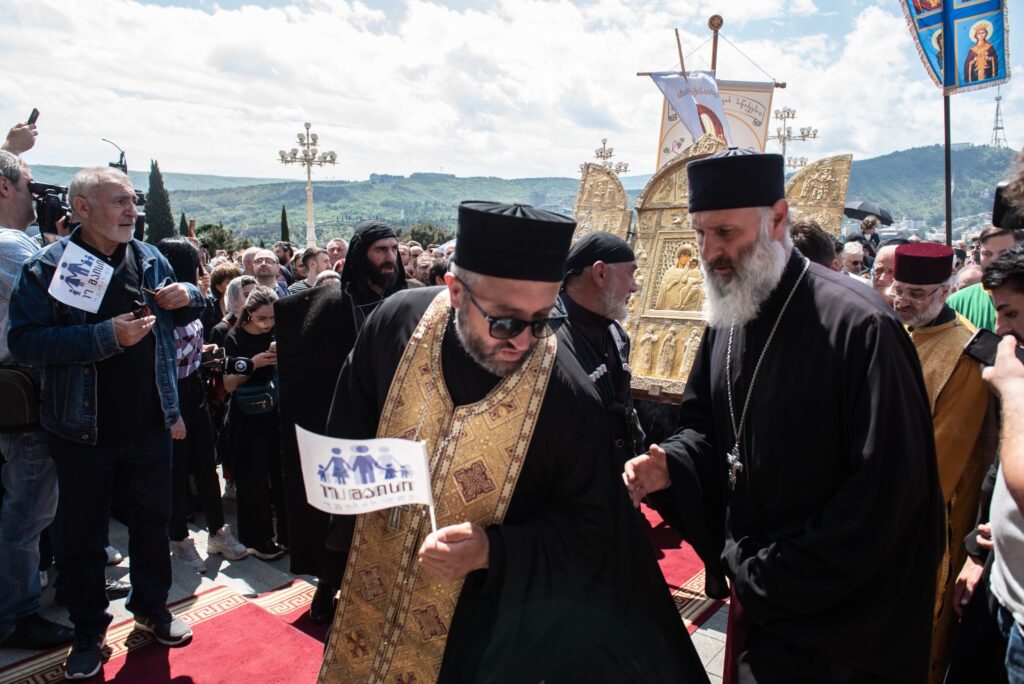The Patriarchate of the Georgian Orthodox Church has called for the country to adopt a law prohibiting queer ‘propaganda’.
In a statement on Saturday, the Church noted that ‘today it may be particularly timely to call on the public to discuss the regulation of the [queer ‘propaganda’] problem through legislation’.
Their statement came a day before Georgia’s annual Pride Week kicked off.
Organisers have faced threats from violent far-right groups, including Alt Info. One of the group’s leaders, Zurab Makharadze, announced that their group would prevent the Pride festival scheduled for 8 July from taking place, and called on the group’s supporters to collect money for this purpose.

In recent months, the Georgian Dream party and groups close to them have ramped up their homophobic rhetoric, increasingly warning of the danger of queer ‘propaganda’.
[Read on OC Media: Georgian Dream ramps up homophobic rhetoric as Pride Week approaches]
According to Saturday’s statement, the Church believes that Pride Week should not be allowed to take place, even if events are held behind closed doors.
‘Unfortunately, the attempt to introduce a perverted way of life in our country does not stop’, they wrote.
‘This is evidenced by the “LGBT Week” announced in July of this year, which, given its goals, cannot fail to have a negative impact even when it is held in a closed space’.
They added that ‘LGBT propaganda is inadmissible and unacceptable’, and that ‘any form of propaganda is violence against the consciousness of teenagers’.
The statement added that the Church had ‘never’ called for violence and that it ‘takes care to maintain peace in the population’.
However, priests have repeatedly been seen leading violent opposition to queer rights activists attempting to demonstrate in public.
On 17 May 2013, on the International Day Against Homophobia, a small group of around 50 queer rights activists were confronted in Tbilisi by thousands of counter-demonstrators led by Orthodox priests.
The crowds, some carrying nettles to beat queer rights activists with, broke through police lines to attack the activists. Police were forced to evacuate the small number of activists from the city centre to avoid further violence.
One of the most widely shared photos of that day was of an Orthodox priest brandishing a stool, which has since become a symbol of violence against queer people in Georgia.
[Read on OC Media: 16–18 May 2013: the days of human tragedies]

‘Determine the right orientation’
Although Mamuka Mdinaradze, the chair of Georgian Dream’s parliamentary faction, said on 3 May that the government would not adopt a queer ‘propaganda’ law, Prime Minister Irakli Gharibashvili made a contrary statement during a plenary session in parliament on 30 June.
Gharibashvili said that he was against ‘LGBT propaganda’ in kindergartens and schools.
‘Let’s clearly formulate our position, what we support, what is unacceptable. For me, LGBT propaganda in kindergartens and schools is unacceptable’.
‘This should be a taboo topic in our country. A debate can be opened on this, and the issue can be regulated at the legislative level, but this requires, of course, the opening of debates and some general consensus’, Gharibashvili said.
On Monday, the PM claimed while discussing a prospective ‘army camp’ for young people, that ‘there are many temptations for our young people’.
‘Young people need to determine the right orientation from the beginning. In this process, the role of our state is very important. First the family and then the state’, he said.




 3 July 2023
3 July 2023



